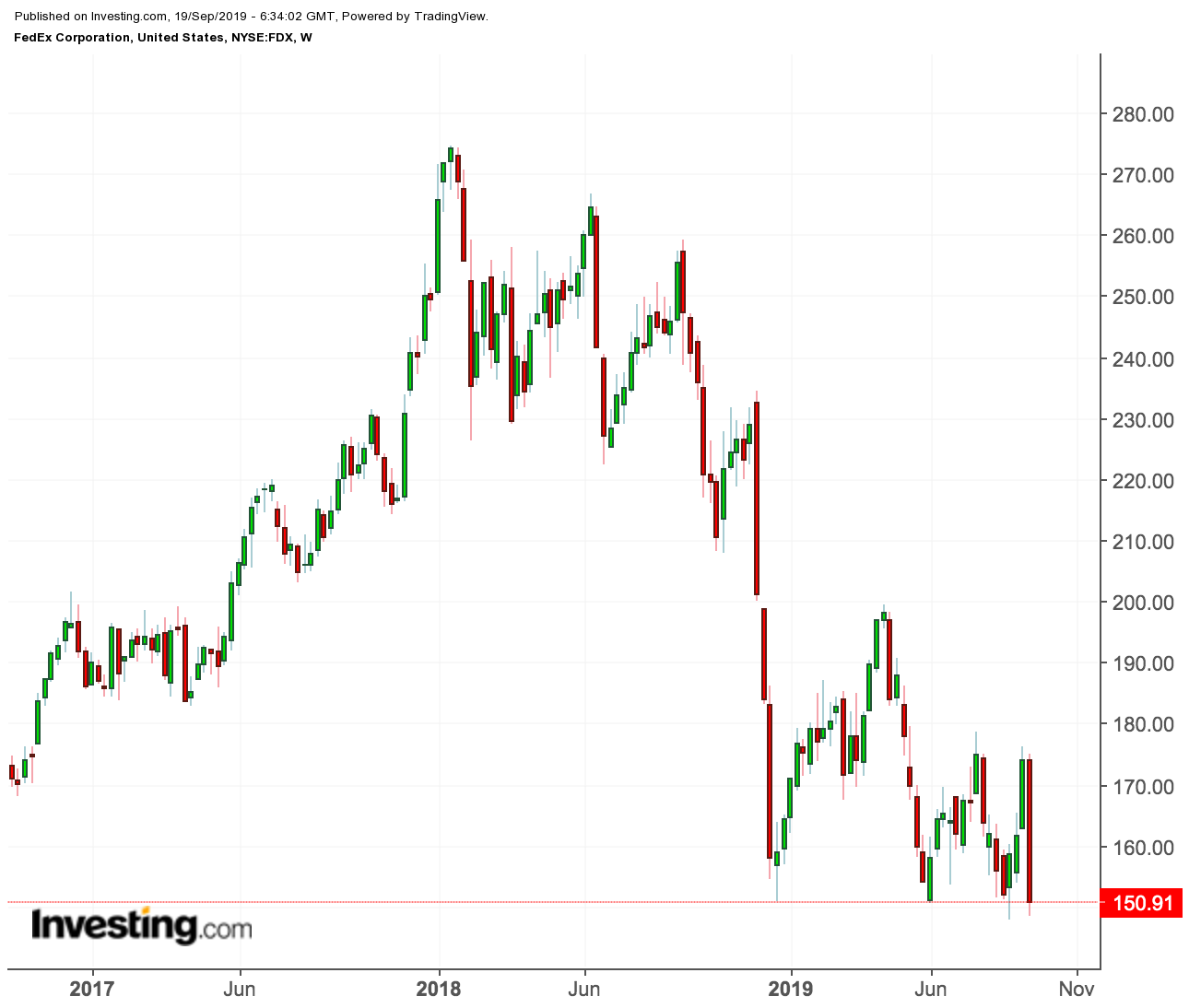The world’s largest parcel-delivery service, FedEx Corporation (NYSE:FDX) (NYSE:FDX), has flagged some alarming news to investors. In its 1Q 2020 earnings statement on Sept. 17, the company slashed its profit forecast for the year as a worsening economic environment, triggered by the U.S.-China trade spat, took its toll on the company’s Express delivery business — which is widely considered a proxy for the global economy.
The Memphis, Tennessee-based transportation giant now expects per-share earnings to fall between 16-29% in the current fiscal year, compared with the forecast of a mid-single-digit percentage decline issued in June. FedEx (NYSE:FDX) also lowered its revenue outlook.
The deepening slump in FedEx shares is also an ominous sign for other industrial stocks, such as Caterpillar Inc (NYSE:CAT). and Deere & Company (NYSE:DE), as the lingering slowdown in global economic activity could further hurt their sales and delay the recovery.
But investors should remember that in an environment of economic uncertainties like the current one, blaming everything on the economy is a tactic many CEOs use to hide the internal issues. In the case of FedEx, there are also several other triggers for this dismal performance.
The biggest one is the company’s continuing troubles at its European business after its costly takeover of TNT in 2015. That deal is still very much a work-in-progress that has failed to unlock the value investors were hoping to see.
FedEx said in March the integration costs for the acquisition are expected to exceed $1.5 billion through fiscal 2021, with the potential of further escalation. The integration challenges and the slowing European economy have raised doubts about the benefits of the TNT deal, with some analysts questioning the wisdom behind this massive undertaking.
After Q1 earnings on Wednesday, analysts from Stifel, BMO, Deutsche Bank and KeyBanc downgraded the stock, putting into question any hopes of a swift turnaround. Deutsche Bank said in a note it has lowered the rating on the the stock to ‘hold’ from ‘buy’ and cut its target price to $142 from $178 because:
"While some may view this as the bottom in shares, we don’t see any support until management takes responsibility for recent performance and clearly articulates a credible path to better results and cash flow (and delivers on it). In the meantime shares will continue to melt lower, and rightfully so.”
With the softening economy, FedEx has also been restructuring its operations to cope with the rise of e-commerce orders. It recently ended is contract with Amazon (NASDAQ:AMZN) and announced plans to offer seven-day home delivery and to handle more of the packages it used to route through the U.S. Postal Service.
Bottom Line
FedEx’s outlook on weakening world trade and the economy cements our view that investors should stay away from buying stocks closely tied with the global economy. It’s tough to see a bottom in FedEx stock as it faces so many headwinds, including macro weakness, issues related to TNT integration and a huge cost escalation. These negative factors will continue to put pressure on the company’s cash flows and sharply diminish the chances for higher dividends.
Blaming increasing trade tensions and policy uncertainty, Chief Executive Officer Fred Smith said in a conference call: “The global economy continues to soften and we are taking steps to cut capacity.”
The profit warning comes after the company posted an 11% drop in fiscal first-quarter profit, driven by the Express unit's weakness, which delivers packages by jet and is especially vulnerable to global trade disruption.
Ominous Sign for Industrial Stocks
That continuing drag sent FedEx (NYSE:FDX) shares tumbling yesterday, falling almost 13% to $150.91, their lowest level in more than two years. The stock is down about 45% from the record high it reached in early 2018 when it hit $274.66 a share.

